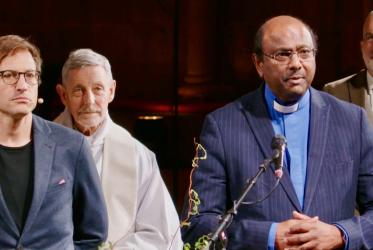Leaders from more than 20 international and national associations of Christian entrepreneurs from 60 countries and diverse Christian traditions gathered at the Ecumenical Centre in Geneva from 22-23 January for a conference titled, “Faith-based Entrepreneurs: Stronger Together.”
They were accompanied by representatives from churches, faith-based development organisations and research institutions. Organised by the Geneva Agape Foundation (GAF) in cooperation with the World Council of Churches (WCC), the conference reflected on two important questions: How can we as Christian entrepreneurs and business people live out our faith? How can businesses contribute to building a fairer and more sustainable planet?
In the face of tremendous global challenges, namely widespread poverty, deepening socio-economic inequalities and a warming climate, “there is an urgent need to build a different economy – a decarbonised economy that provides for the needs of all people,” observed Prof. Isabel Apawo Phiri, deputy general secretary of the WCC, in her opening address. Here, “businesses and start-ups – working together with communities and governments – could make a difference,” Phiri said.
For Rolando Medeiros, president of UNIAPAC International, a federation of Christian business associations in over 40 countries inspired by Catholic social thought, business ought to be viewed as a noble vocation. In his keynote address, Medeiros called for “a corporate culture where the purpose of a business firm is not simply to make a profit, but is to be found in its very existence as a community who offer their talents, skills, and knowledge to help build and fulfil a purpose of common good.”
“Profit is a regulator of the life of a business, but it is not the only one; other human and moral factors must also be considered which, in the long term, are at least equally important for the life of a business and at the core of turning business into a noble vocation,” Medeiros added.
Pastor John Enelamah, founder and director of Apostles in the Marketplace based in Nigeria, observed that practising faith in business can have a transformative impact on society.
Prof. Yu Bin from Minzu University in China spoke of Christian entrepreneurship in the Chinese context. “There is much in common between Protestant teachings, which see work as prayer and the workplace as a space to glorify God, and ancient Chinese wisdom,” he said.
The international conference, moderated by Prof. Christoph Stückelberger, director of GAF, adopted the “Faith in Business Geneva Declaration” with 12 commitments across denominations, stating among others:
“We are committed to serve through creating dignified jobs and quality products, innovating, ensuring just working conditions, paying taxes, protecting the environment, investing in communities and in ecological sustainability, and supporting philanthropic and diaconal projects, among others.”
On finance, “we are committed to make business finances and especially investment policies and practices consistent with our faith-based values and virtues (Luke 16:13). We commit to divesting from activities that destroy the social and ecological fabric of life and to investing in activities that contribute to social and ecological wellbeing.”
Further, “we are committed to support the implementation of the UN Sustainable Development Goals (SDGs). They concretise the works of love (Matt. 25: 35-36).”
Participants agreed to continue cooperation and networking among associations of Christian entrepreneurs. Prof. Cui Wantian from China, founder and president of the GAF, closed the conference by announcing the 2nd International Conference on “Faith in Business: Stronger Together” on 21-22 January 2019 in Geneva.






